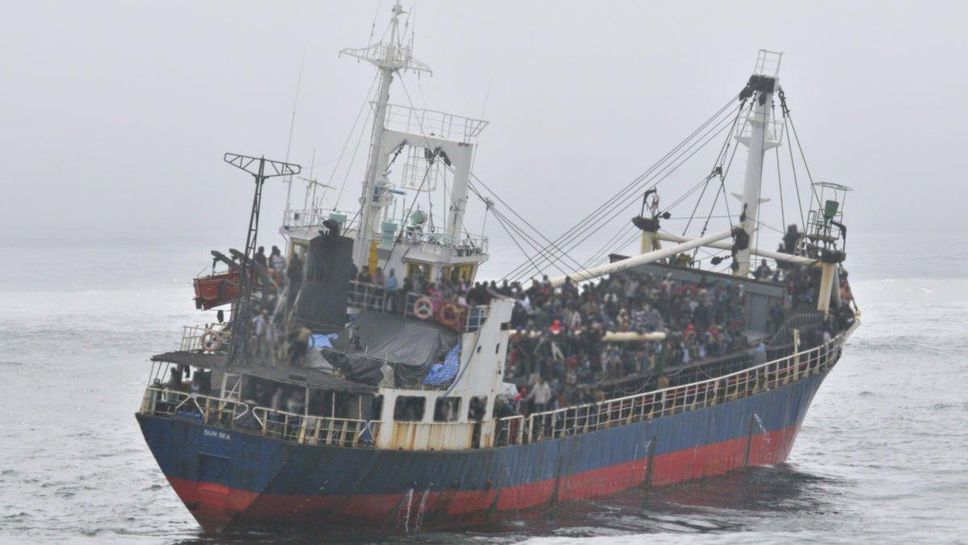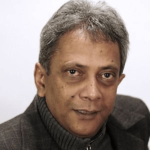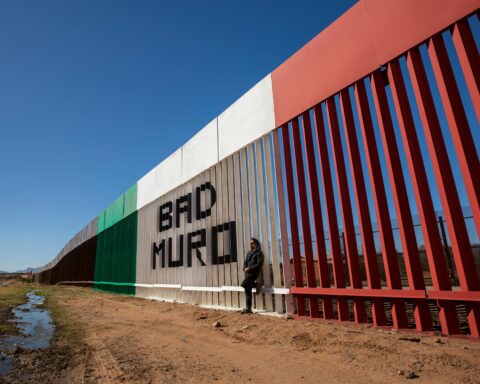Sivathasan Sinrasa* was barely 14 years old when his parents bundled him on a plane bound for Thailand, where he met with the human smugglers who were to bring him to Canada.
The teen was escaping imminent arrest in the post-civil war crackdown by the Sri Lankan government. His brother was already in jail for being a member of the Liberation Tigers of Tamil Eelam (LTTE), a separatist group that lost its fight for an independent homeland in Northeastern Sri Lanka.
“They were coming for me, and my parents were desperate to get me out of the country…they had tried everything, including asking for help from local NGOs, UN, and Canadian officials,” Sinrasa told NCM.
“The officials wanted ID documents and other papers, but we had lost them during the war…others wanted proof that we were not terrorists…Some friends then told my parents about the boat in Thailand, and they got fake documents for me by paying about 200,000 rupees (then about CAD $2,000),” he said.
“When I got on the boat in Thailand, it was already crowded with hundreds of other people…All of us were desperate to get to Canada.”
No prosecutions
Sinrasa was among the 492 Sri Lankan Tamils who boarded the MV Sun Sea in the Gulf of Thailand. They and their families had agreed to pay the human smugglers between $20,000 to $30,000 each to get them to Canada.
After a three-month harrowing journey through Malaysian and Philippine waters and across the Pacific Ocean, the MV Sun Sea was intercepted off Canada’s West Coast on Aug 12, 2010.
The arrival of the MV Sun Sea in British Columbia is one of the most notorious and controversial cases of migrant smuggling in Canada, said the United Nations in a report on the incident. It was the second ship of Sri Lankan asylum seekers to reach British Columbia in 2010. The MV Ocean Lady arrived earlier with 76 passengers.
“I had five half-litre bottles of water and little food for the entire trip…one person died,” said Sinrasa, who, like most of the others from the MV Sun Sea, has become a permanent resident of Canada.
“I don’t think any of us would have come on the boat and across the ocean like this…it was a terrible journey…but we were desperate and had no other way of getting to Canada,” said Sinrasa, now a mechanic in Vancouver.
None of the four people accused of being the masterminds and who later claimed refugee status in Canada were successfully prosecuted for human smuggling.
Sinrasa’s desperation to get to safety by evading border controls and visa requirements is among the main reasons human smuggling syndicates continue to thrive globally, say immigration and refugee experts.
The United Nations Office on Drugs and Crime states that most irregular migrants resort to the assistance of profit-seeking smugglers as border controls have improved.
“The more you make it hard for people to immigrate from one country to another provides more opportunities for human smugglers and organized crime groups,” said Yvon Dandurand, a criminologist at the University of the Fraser Valley in British Columbia.
Not a priority
In a recent report for the International Centre for Criminal Law Reform (ICCLR), Dandurand and his colleagues pointed out that because of a lack of effective law enforcement cooperation with refugee source countries and measures for the effective prosecution of migrant smugglers, the problem is becoming more serious in Canada.
“During the consultations (for the report), it was suggested that efforts to date to counter the problem of migrant smuggling to Canada have not been very effective. There have been very few successful investigations and prosecution of this crime,” said the report.
Speaking to NCM, Dandurand said part of the problem with migrant smuggling is that Canada has not identified it as an important priority.
“There is always some confusion about people being smuggled and people being trafficked,” he said.
According to INTERPOL, human smuggling is voluntary as the person involved chooses to be smuggled and has agreed to pay another person or group of people to commit a crime. However, human trafficking is not voluntary and does not end when the trafficked person arrives at a destination, but instead continues while the person is exploited for labour or services.
“Your colleagues in media, particularly in parts of Europe and Canada and the US, have almost completely abandoned the distinction when they talk about people being trafficked when they mean smuggled and of course the public does not understand the difference,” said Dandurand.
“In many cases these human smugglers are hailed as folk heroes helping people get to safety and they are assisted by the diaspora overseas…investigations and prosecutions are rare unless there is a tragedy like the recent deaths of an Indian family at the Manitoba-US border crossing,” he said.
In that case, four members of a family from India were found frozen to death 10 metres from the US-Canada border three months ago. The tragedy has sparked investigations in Canada, India, and the US, where the alleged human smuggler, Steve Shand from Florida, is to stand trial on July 18.
In India, the case has triggered multiple investigations, arrests, and the formation of a task force to thwart the thriving human smuggling rackets in the Indian state of Gujarat.
A team of investigators from the RCMP and the FBI are currently in Gujarat to widen the scope of the investigation into Indian human smuggling rackets, working in tandem with North American accomplices.
“Everyone knew this was going on, but It took a tragedy to get this international investigation going,” said Dandurand.
Even before this tragedy, a Canada Border Services Agency (CBSA) intelligence report had signaled that Indian nationals would increasingly use sophisticated human smuggling networks to get to North America.
“Once (pandemic-related) travel restrictions begin to lift, more Indian nationals are expected to look for employment opportunities in wealthier countries such as Canada and will likely use the resources of sophisticated smuggling networks to do so,” according to the report, which listed India as a top source country for illegal immigrants.
Other than India, the report, obtained by Richard Kurland, a Vancouver- based immigration lawyer, listed Mexico, Iran, Haiti, Pakistan, China, Nigeria, Turkey, and Sri Lanka as top source countries for irregular migration to Canada in the post-pandemic era.
Tested smuggling routes
The 2021 Trafficking in Persons Report by the U.S. State Department concurred with the Canadian intelligence, saying the Indian government has modestly increased anti-trafficking law enforcement efforts, although efforts remained inadequate compared to the scale of the problem.
“Refugees are desperate, fleeing persecution, and have money to secure entry by any means necessary. We cannot ever eliminate human smuggling,” said Kurland.
“At best, we can try and manage the flow but no matter how much money or technology we throw at the problem, it will be a continuous game of cat and mouse,” he told NCM. However, he noted that some international efforts are having the desired effect of raising awareness of the perils of working with human smugglers.
One of them is STARSOM, a two-year (2021-2023) Canadian-funded project to counter migrant smuggling across routes leading to North America and crossing multiple countries in South Asia, the Middle East, Africa and Latin America and the Caribbean.
“Migrant smuggling is a global and profitable crime with a high demand and a low risk of detection for the criminals involved,” said Panagiotis Papadimitriou, the leader of the UN team that coordinates the STARSOM initiative.
“People resort to smugglers when they need to escape poverty, natural disaster, conflict or persecution or are seeking employment and education opportunities but do not have the options to migrate legally,” he said at the launch of the program last November.
The new project focusses on a popular smuggling route that starts in Asia, transits the Gulf States, West Africa, Latin America, and the Caribbean and then heads towards the United States and Canada.
For Sinrasa, who arrived in Canada aboard the MV Sun Sea 12 years ago, efforts to curb human smuggling have little effect in places like his Sri Lankan homeland.
“It would be better to make it easier for people fleeing persecution and human rights violations to come to Canada…but most of them are not eligible, so they use human smugglers.”
(Sivathasan Sinrasa* is a pseudonym of the refugee, who requested it fearing for the safety of his parents who are still in Sri Lanka. Read here NCM’s policy on using pseudonyms or anonymous sources.)
Next in the series: Smuggling of Mexicans from Canada to the U.S. a regular occurrence
A multiple-award winning journalist, Fabian Dawson is an internationally acclaimed author, filmmaker and media expert. His work over the last four decades spans the globe and he also serves as a consultant/strategic advisor to a variety of international companies. As deputy editor-in-chief of The Province, part of the Postmedia chain, Dawson led initiatives within a special publications group to provide directed content for a variety of organisations. He was named the 2019 recipient of the Bruce Hutchison Lifetime Achievement Award at Jack Webster Awards. Dawson has been invited by the governments of India, Malaysia, Taiwan, China, Hong Kong and the United States to act as a media observer/advisor on a variety of Asian-Canada issues. Dawson, now operates FD Media, which specializes in harnessing editorial assets to revenue generating opportunities.





